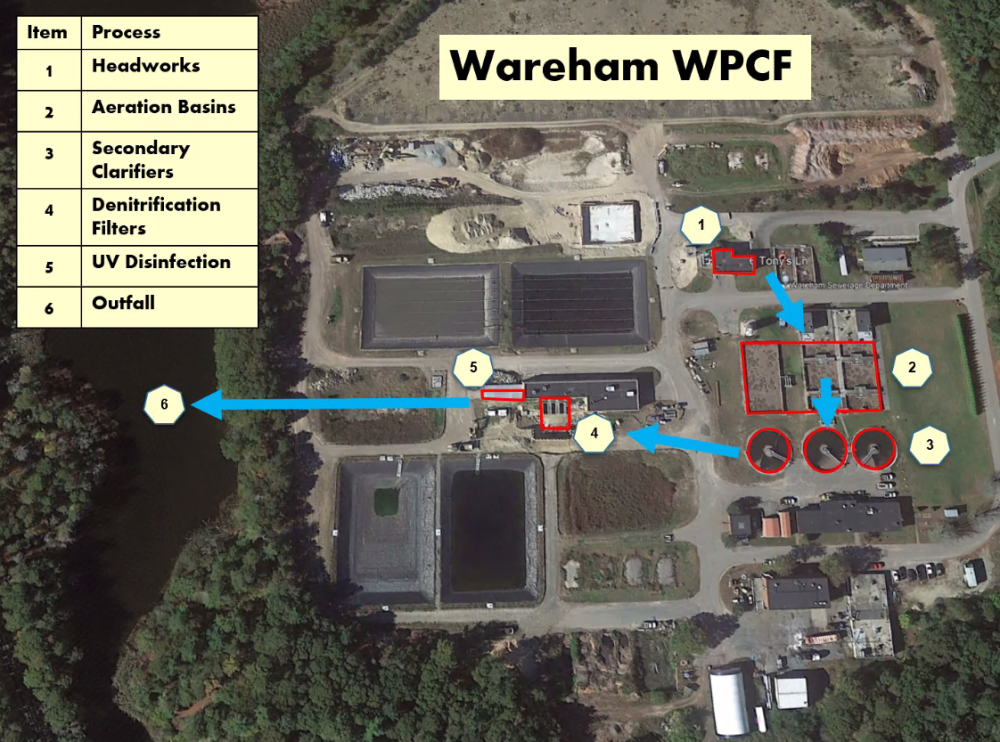$36 million sewer repairs recommended by Select Board
After not succeeding at the July Special Town Meeting, the Sewer Commissioners’ request for a $36 million borrowing authorization to make repairs to the town’s sewage facility will be brought before voters again at the Fall Town Meeting on Monday, Oct. 23 and this time, the Select Board is recommending favorable action.
The Sewer Commission and outside consultants have argued that the system’s “headworks” and “clarifier” — which handle sewage at the beginning of the treatment process — are reaching the end of their useful life and that replacing them is critical to keep the plant functioning.
This past summer, the Select Board voted 3-2 not to recommend voters consider this borrowing authorization request. They cited a lack of information as their reasoning. Now, the Board is split.
While Select Board Chair Judith Whiteside and member Tricia Wurts voted “yes” to recommend the request be approved, member Ronald Besse voted “no,” member Alan Slavin abstained and member Jared Chadwick was not present for the meeting.
Whiteside said the presentation done by the Sewer Commission’s consultants at GHD was “far more substantive” this time around.
“I think it raises some questions, but I think it gives the residents of the town, particularly the users, an enormous amount of information,” she added.
Whiteside will work with GHD to get the presentation on the town website.
Besse said he was still concerned with the costs of these repairs and how it will affect user fees.
The Commission and its consultants have stated the financial plan for this project includes receiving a loan from the State Revolving Fund, in which Wareham could qualify for 10% principal forgiveness, essentially meaning grant funding. In addition, there would also be zero to 2% interest on this loan.
There would also be a 17% contribution from Bourne through an intermunicipal agreement.
The project would be completed in a few years and sewer fees would need to be raised an additional $46 per user, according to GHD’s presentation.
Besse pointed out this cost is much lower than what was projected at the Special Town Meeting.
Sewer Commission Chair Bernie Pigeon said this request was brought to the previous meeting in addition to a request relating to the repairs at Swifts Beach, which raised the fees by $84. The $46 would be in addition to those fees for an approximate total of $130.
In their presentation about the repairs, the GHD consultants, Marc Drainville and Sara Greenberg, emphasized that these repairs are not a “Band-Aid” and are vital to the function of the Water Pollution Control Facility.
Greenberg said more repairs need to be made to the facility, which means there will be more costs in the future.
“I'm concerned about what it's going to do to some of our residents that are struggling to afford now to be able to stay and survive,” said Besse. “Are they going to be able to continue to stay and survive with all of the additional money that we're going to be putting on top of them?”
Drainville said it is important to note that over the next few years more of what the Commission currently owes will be paid and much of this work is going to be done in an attempt to increase the facility’s capacity. Both would decrease the financial impact of these repairs and upgrades on a single user.
Currently, growth at the plant is at a “standstill” until the Commission can find a solution to increase its outfall, Pigeon said.
Wurts acknowledged Besse’s concerns, stating she felt the same way a few months ago.
However, she said in hearing financial presentations she better understands how these sewer repairs will be paid for and how the state’s pressure to put everyone on sewer and the future growth of the town will work to the sewer's benefit.
“There's remaining parts of the development that really needed to be looked at as a full town cost, not just who has sewer right now, and it gave a whole different perspective on how to look at this pricing and cost,” Wurts said.
She added residents would benefit from hearing and having the same information.
Slavin said, “I'm concerned that the plant — no matter what you do — is going to be obsolete because of the changes and developments going through.”
He added, “I don't have a lot of faith in the condition of the plant overall.”
In response, Drainville compared the sewage facility to a house and said although the infrastructure of the building itself remains strong, the inside equipment needs to be upgraded.
“We've really let this thing go too far, and we're all responsible for it,” Slavin said. “There is no solution here right now. This is just a Band-Aid and just be prepared to spend a lot of money over the next 10 to 15 years.”













